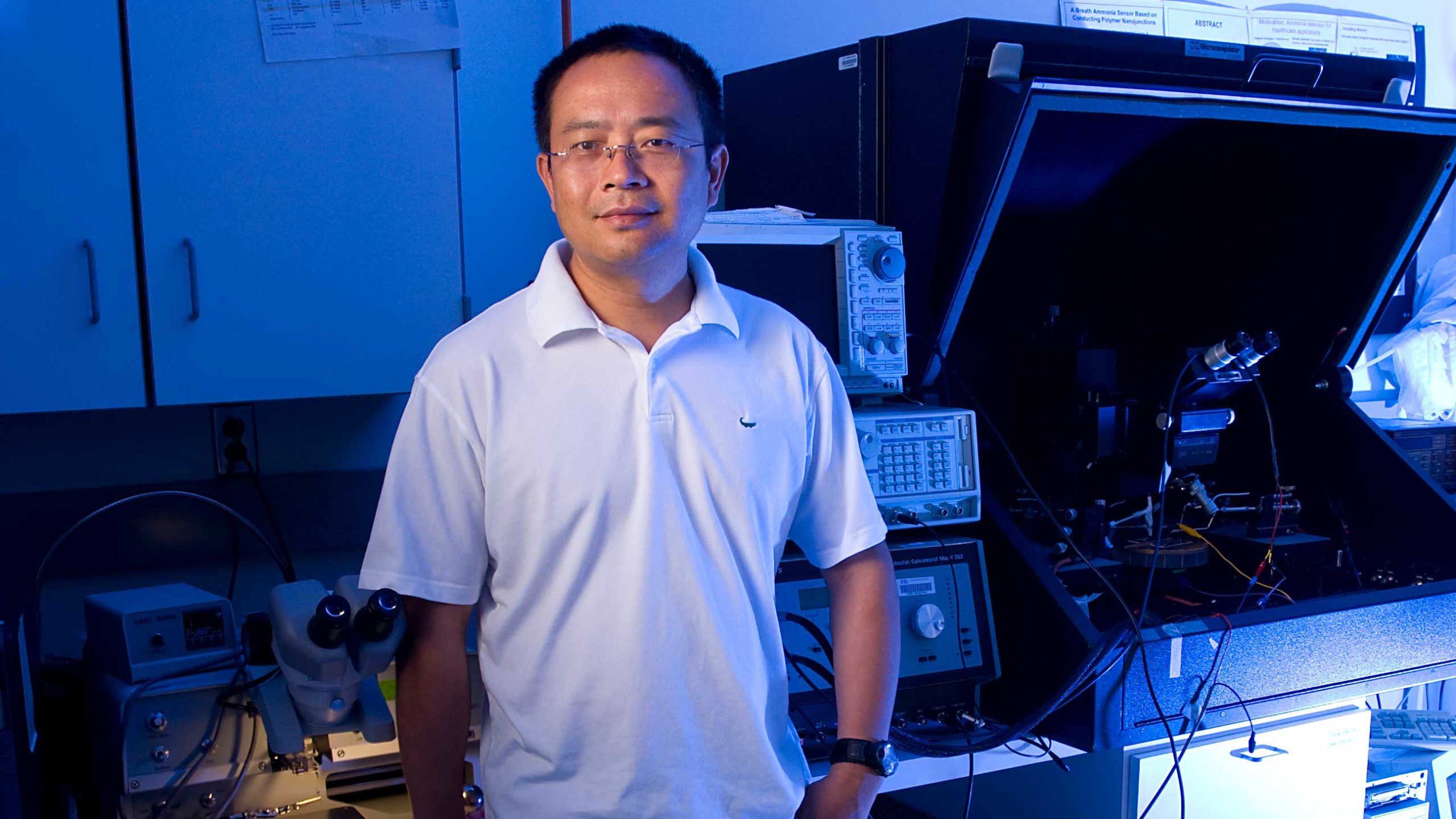In memoriam – Nongjian “NJ” Tao

Remembering Nongjian “NJ” Tao
NJ came to ASU in 2001 where he joined the faculty in the School of Electrical, Computer and Energy Engineering. He quickly established himself as an expert in personal sensing technologies and in 2008 became the founding director of the Biodesign Center for Bioelectronics and Biosensors (BCBB).
Known around the world, NJ has been an influencer in the fields of molecular electronics, nanoelectronics, chemical and biological sensors, and wireless devices for mobile health. He’s received more than 25 U.S. patents, published over 300 papers and has been cited thousands of times. But what might be his greatest professional legacy are the teams of scientists who trained under him. Scientists, who are now improving the world in labs around the globe. His work lives on in them.
Nongjian Tao leaves behind his wife Shuang Huang and their children, Kathy and Kevin. Our deepest condolences go out to them.
Memorial scholarship
Gifts may be made to a memorial scholarship as follows:
Make checks out to “ASU Foundation” and write “Dr. Nongjian Tao Memorial Scholarship” in the memo line.
Send to
ASU Foundation
Attn:Financial Services
P.O. Box 2260
Tempe, Arizona 85280-2260
Obituary
Nongjian Tao (1963-2020) was an internationally renowned scholar, researcher, inventor and entrepreneur. He will be remembered by his colleagues and many graduate students as much for his kind and gentle spirit as for his intellectual brilliance. Nongjian came to the US in 1984 to study for a PhD in physics at Arizona State University (ASU). He was among the tiny number of elite physics students chosen to attend US universities under the “China-US Physics Examination and Application” (CUSPEA) program, started by Chinese-American Nobel Laureate TD Lee as one of the first openings between the two countries. As a graduate student, he made several key discoveries while investigating the physics of DNA molecules, publishing 12 papers on the subject in the latter years of his PhD studies. After postdoctoral research at City College, New York, he returned to ASU, working in the very new area of Nanoscience. In 1992, he was recruited to a faculty position at Florida International University (FIU). While at FIU, he carried out a landmark experiment in molecular electronics, at a time when he had no graduate students or other help in the lab. The 1996 single-author paper describing his remarkable result won him the prestigious Hellmuth Fischer Medal in 2003. He also invented a method for greatly increasing the sensitivity of chemical measurements based on the reflection of light.
He was recruited as a full professor in Electrical Engineering by ASU in 2001, becoming Director of the Center for Bioelectronics and Biosensors in the Biodesign Institute in 2008. He was awarded the Alexander von Humboldt Senior Research Award in 2004, the Arizona Technology Enterprise Innovator of the Year in 2006, and the Microscopy Today Innovation Award in 2013. While at ASU, he founded two companies based on his inventions. Biosensing Instrument, founded in 2004, commercializes his inventions in improved optical sensing and imaging (https://biosensingusa.com/). Breezing (founded in 2011) produces the first device for mobile metabolic rate monitoring (https://breezing.com/). His research output was prodigious: He published 350 research papers which, at the time of death had been cited by other researchers nearly 30,000 times. The impact of his papers is measured in his “h-index” of 90, greater than that of most Nobel Prize winners. His paper on a new way to measure the electrical properties of molecules alone has been cited more than 2000 times. He was awarded 26 US patents, most of which have been utilized in new products produced both by the companies he founded and by other companies. This body of work was recognized in his election to fellowship in professional societies in addition to many other awards. He was elected fellow of AAAS and served as an editor of the Journal ACS Sensors from 2005 to the time of his death.
In addition to his beloved wife of 34 years, Shuang Huang, he leaves behind his daughter, Kathy, his son, Kevin, brothers Fushou Tao and Longgang Tao, sisters Xianjuan and Miaojuan Tao and mother Yuxiou Jiang.